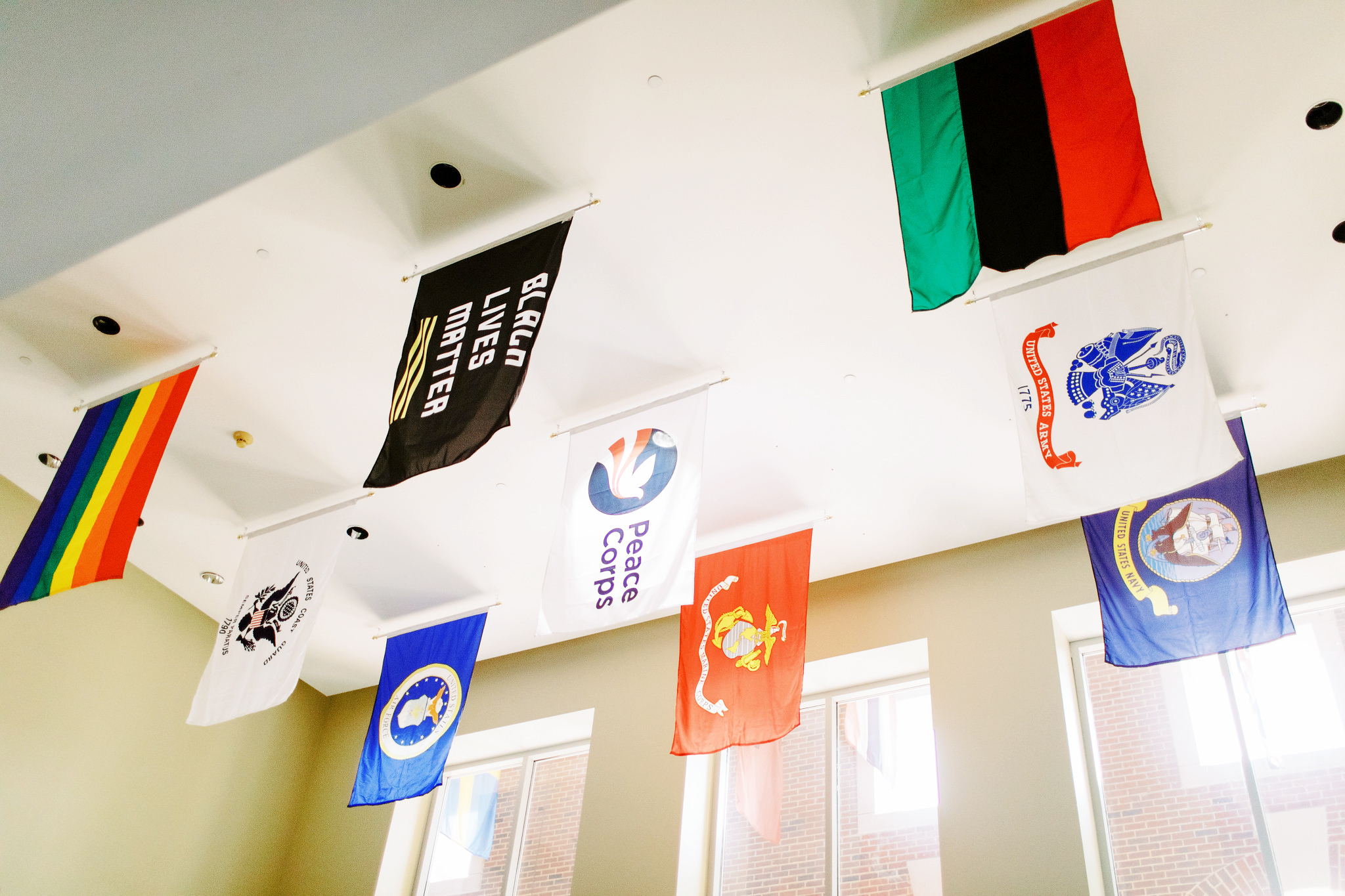
Kenan-Flagler students
University of North Carolina, Kenan-Flagler Business School
“Slow and steady.”
Sounds like an anachronism from a bygone era. These days, experts urge you to move fast and make a splash – make the big move to deliver a message. That’s not the Carolina way. And that’s fine – Kenan-Flagler’s strategy is working out just fine.
Over the past two years, the Kenan-Flagler Business School has climbed from 14th to 6th in P&Q’s Undergraduate Business School Ranking. Chances are, Kenan-Flagler won’t stop there, thanks to strong employment outcomes, high admissions standards, and satisfied alumni.
Let’s start backwards. This year, Kenan-Flagler boasted a 98.03% placement rate for graduates, second-best among ranked schools. 2020 grads also banked $77,826 – up from $73,410 a year before. Of course, a Kenan-Flagler graduate is a pretty safe hire for employers. After all, the school accepted just 11.51% of applications, making it a school for elite students – with over three quarters ranking among the top 10% of the high school classes. How do students feel about the Kenan-Flagler? Let’s put it this way: the school produced one of the five-highest scores when alumni were asked if the program was worth the cost.
Certainly, the STAR program – Student Teams Achieving Results – is central to the Kenan-Flagler experience. And the program lives up to its name, with students coming together to tackle issues for sponsoring companies no different than a consulting team. At the same time, the school maintains a robust portfolio of international programming. These are highlighted by GLOBE, a mix of coursework and experiences capped off by a study abroad program. In addition, the school is pursuing some ambitious goals. In May, Kenan-Flagler announced that it had received an $11 million dollar gift from UNC alum Steve Bell– money it will be earmarking towards growing the undergraduate business program by 50%.
If you polled Kenan-Flagler business majors on what truly mattered, however, the answer would almost universally be the community – students and faculty alike who brought out the best in each other. That was certainly the case for 2020 grad T.J. Tucker, who transformed from a rural charter school student to a JP Morgan investment banker over his four years at Kenan-Flagler.
“I was both excited and worried about coming to a much larger, public university like UNC-Chapel Hill,” he recalls. “The idea of going to football games and being surrounded by thousands of students thrilled me, but I was scared that I wouldn’t find that smaller, “homey” place on campus. However, my business school became that for me. With a smaller student body and its own building, UNC Kenan-Flagler supplied the best of both worlds – the big campus feeling from UNC and a more intimate setting from the business school. Additionally, the smaller student population allows faculty and staff to build close, more personal relationships with students.”
Last week, P&Q invited Kenan-Flagler administrators to provide some insights into their hands-on, globally-focused programming, along with sharing what business majors can expect from the school in the coming years. Here are some thoughts from Wendell Gilland, associate dean of the undergraduate business program and associate professor of operations and Amy Bugno, director of career development and employer relations for the Undergraduate Business Program.
5 QUESTIONS WITH WENDELL GILLAND AND AMY BUGNO

Wendell Gilland
P&Q: Kenan-Flagler accepts just 11.51% of applicants who average 1451 on their SAT. What are two key qualities that prospective students must possess to land a spot in your program? Why are they so important? What are two things that prospective students can do to enhance their odds of landing a spot at Kenan-Flagler?
Gilland: “Integrity and an inclusive, team-player mentality are qualities that are an absolute must for gaining admission to UNC Kenan-Flagler’s Undergraduate Business Program. These qualities are not only in alignment with our Core Values, but equally important, they are hallmarks of our philosophy of doing business the “Carolina Way.”
Our pre-business passport guides students in terms of how they should invest their time in their first few semesters at Carolina to best prepare themselves for the application process. It contains things like the following:
* Mock Interviews
* Resume workshops
* Self-Assessment workshops (Strengths Finder)
* Joining a b-school club (all of our clubs are open to non-business and first-year students)
* Attending events at the b-school (speakers, application workshops)
* Attending Career Fairs for career exploration (especially our Undergraduate Business Symposium).”
P&Q: One of Kenan-Flagler’s signature experiences is the STAR (Student Teams Achieving Results) program? What does this program involve? How does it position business students for early success after graduation?
Gilland: “STAR is one of the jewels of the UNC Kenan-Flagler Undergraduate Business Program. In this truly experiential course, student teams disaggregate a real business challenge, conduct extensive research and, ultimately, present recommendations to an executive audience.
The UNC Kenan-Flagler STAR Program matches teams of Undergraduate Business and MBA students with national and global corporate partners to solve real, complex business challenges. STAR teams have identified new opportunities for Coca-Cola in Asia, helped NASCAR reach new audiences, crafted an innovative solution to a sustainability issue for Procter & Gamble, and have developed many business plans for both for profit and nonprofit organizations.
Students get experience in solving ambiguous problems, working on diverse teams, and engaging directly with corporate partners, which is excellent preparation for launching their careers. They apply what they have already studied in earlier classes and keep learning while working on the STAR project. Afterwards, they can apply those lessons during internships and in post-graduation jobs. They approach their careers with more confidence and capabilities based upon their exposure to working extensively on a diverse team and directly with corporate partners. Even if they don’t plan to work in consulting, they develop skills they can transfer to any career opportunity.
P&Q: Over the past two years, you’ve climbed from 14th to 6th in our newest undergraduate business ranking. What are some new and upcoming developments in your program that will enhance the business program for future business majors?
Gilland: “One is excellence in the classroom – we closely monitor course evaluations and student surveys, meet regularly with faculty to ensure we are doing the absolute best we can do in the classroom, and facilitate means for faculty to share best practices (especially during this pandemic).
We also have staff dedicated support students in terms of building community, mental health, and DEI. Our students also follow five Guiding Principles: Be Humble, Be Curious, Be Agile, Be True, Be Kind, and Be Purposeful). At the same time, we have added SPARK, our new on-boarding program for incoming students. In addition, there is an emphasis on diversity of interests and self-awareness and supporting students as they find their purpose. Plus, we offer “Choose Your Own Adventure” sessions covering a range of industries and functions from finance to non-profits to healthcare to sustainability.”

Kenan-Flagler Career Symposium
P&Q: Last year, you produced a 98% placement rate. What types of programming through your career services, classroom curriculum, and extracurricular activities that give your students an advantage in the marketplace?
Bugno: “At UNC Kenan-Flagler, a student’s career development grows through every experience they have – courses, study abroad, clubs and student organizations, career workshops, and professional opportunities. We help students see the connections between these experiences and their futures by designing enhanced career programming and using career-coaching techniques that help them connect the dots for short-term gains and long-term success.
We use a student-centered approach to customize career programming. While we typically offer annual events, such as the Undergraduate Business Symposium, Investment Banking Boot Camp and a series of treks, we constantly innovate new programs based on the needs of students in any given moment.
For example, as headlines of cancelled internships flooded news feeds in April 2020, we worked quickly to launch a Career Impacts website, which provided step-by-step guidance and resources for students based on common situations (“My internship was cancelled.” “My full-time job start date was delayed.” or “I haven’t yet heard what my internship employer is going to do.”). By making this problem-based resource available to students 24/7, we assisted many more students than we would have had capacity for one-on-one conversations.
We also created three new webinars based on common questions from students, including topics like the following:
* Stringing together a variety of summer experiences
* What to expect from Fall 2020 Recruiting
* Managing recruiting stress during an unprecedented time.
While the pandemic created more of a need than a typical year, we always have abided by a philosophy of creating and delivering content that students want or need, rather than repeating the same events year after year.
Our messaging around career development starts at orientation. From the very beginning, we want students to know that their career will likely NOT be linear and that self-awareness, understanding their own motivations, interests and values, and being open-minded to new opportunities are critical parts of the career development cycle. We use orientation to help them reflect internally and get exposed to the many different career options they have. Then throughout their 2.5 years with us, we offer ways for them to continue to explore and reflect as they find the best fit for themselves as individuals.
We believe that if a student can truly connect their internal desires to a career path (as opposed to external voices like parents, peers, or the allure of high salaries), they will be more authentically invested in recruiting processes, perform better in both interviews and the workplace, and ultimately have more job satisfaction. We teach them the skills they can use to continually reflect and assess throughout their careers so they can be ready to advance, pivot or go in a completely different direction with confidence when the inevitable decision points come along.
Our Undergraduate Career Team staff works closely with faculty to connect classroom content with career development. We often bring our Career Coaches into the classroom to provide additional lessons on topics like professional communication or online presence, facilitate reflection sessions after group projects so students can tell effective interview stories, or give feedback on final presentations. Some faculty have worked with Career Coaches to develop course materials and content, ensuring that students get consistent messaging around careers from many perspectives around the School. This collaboration also extends to our faculty-lead study abroad programs, which have career development content woven throughout the curricula.
We have 24 recognized student organizations affiliated with the Undergraduate Business Program. While many are directly career-oriented (Marketing Club, Real Estate Club, etc.) all of our clubs have some component of professional development for their members. Our Career Coaches work closely with clubs – many times as official club advisors – to make connections with employers and alumni for events, develop programming and plan career boot camps and treks.
At UNC Kenan-Flagler, many of our employers engage in the career education of our students as well. In addition to their regular information sessions and career fair booths, they have helped us with the following:
Resumania: Two full-day virtual resume review days. Students could drop-in without an appointment and get resume feedback from recruiters.
Case Competitions: We host multiple case competitions each year in collaboration with employers such as Deloitte, EY, P&G, and more. Employers can evaluate students, but they often also provide coaching and feedback for students as part of competition.
Club Workshops: Many of our clubs hold regular panels or topical discussions and invite employer representatives (frequently alumni) to share their experiences and provide insider insight for students.
Diversity Events: This fall, we had two employers engaged in diversity specific programming, including a “Dress for Success” workshop and an “Authenticity is Power” personal branding workshop.
Technical Seminars: For many years, Wells Fargo has sponsored technical seminars delivered by Training the Street for our students. Their financial sponsorship allows us to deliver this high-level extracurricular programming to students at no cost.
Networking Practice: We have hosted multiple networking practice events for students over the years. In this lower-stakes environment, our career team educates students about elevator pitches, and employer reps help them practice and provide feedback.”{
P&Q: Nearly three-quarters of your business majors have immersive experiences abroad. With COVID ruining everyone’s plan, what have you been doing in place of these experiences to give your students international exposure?
Gilland: “Despite COVID ruining our ability to offer in-country, business-centric programs, we continue to provide global experiences that equip our students with relevant skills for an international workplace.
We feel that actively pursuing all learning and curiosity about the world is more important than ever. We believe students who participate in international educational experiences, virtual or otherwise, are better prepared to work across borders to create and implement solutions to global issues.
While we look forward to resuming in-country programs, we are excited to offer innovative avenues for you to build your global perspective.
Here are our offerings this academic year:
Virtual GIEs (V/GIEs): Two virtual Global Immersion (GIE) electives: South Africa AAP and Hungary. Our students connect and network with students in those countries.
International Business Club: Students connect with students all around the world while also learning about global business trends in new Undergraduate International Business Club. They explore global business trends through speaker series, professional development workshops and social events.
International Case Competition: Students compete alongside other top U.S. business school teams in a virtual case competition centered around Amazon’s potential investment in Chile or Argentina, with the winning team pitching to Amazon executives.
Global Topics Speaker Series: In the fall we launched a speaker series that highlights global careers and cultural experiences of recent UBP grads and international students. Our first panel in October showcased 2020 UBP grads discussing, “How does my global experience guide me in these uncertain times?” In November, UNC Vice Provost for Global Affair Barbara Stephenson drew from her experience as a U.S. ambassador and career foreign service professional to share “Why thinking globally is so crucial in 2020?” Other panels discussed ways an international experience helps guide us during uncertain times, and how students and alumni living and working around the world view international business in a post-COVID world.
For summer we’re specifically exploring…
A) Virtual summer business courses through our European and Asian partner universities.
B) Potential May 2021 Global Immersion Elective
C) Remote International Internships. We are partnering with our internship providers to offer remote international internships for summer 2021. Students can intern remotely for a company overseas where they will complete project-based work for small to medium-sized companies in a variety of career fields while earning elective credit. They will have frequent engagement with their company supervisor who will mentor them throughout the completion of their remote international internship. In addition to gaining global work experience, they can expand their professional network and master technical skills needed to succeed in a virtual business world.
P&Q: What part of the Kenan-Flagler undergraduate business experience do you wish more prospective students knew about? Why is that so important to their development as professionals?
Gilland: We offer financial aid/scholarships for international experiences: 100% of our students who request it receive it. We also offer personalized advising for academic, global, and career pursuits.
In addition, we are addressing DEI strategically and with a sense of urgency, from required and elective courses, to town halls to connect with and listen to our students, and the leadership our student leaders, including a Community, Equity and Inclusion Board.
The school, as a whole, added inclusion as a core value. The school formalized our five core values – excellence, leadership, integrity, community and teamwork – in the late 1990s. We added the new core value to formally recognize that diversity and inclusion are intrinsically critical to achieving our other core values.
A new mural by local artist Paul Friedrich on the third floor showcases the UBP’s guiding principles (be curious, purposeful, kind, agile, true, humble) which stem from our core values.

Joining the affinity flags (an initiative started by UBP students) hanging in the lobby in front of our large auditorium and the primary gathering places for major events is the Black Lives Matter flag.
A few other under the radar programs include the Allison Mentorship Program, which offers professional development and application readiness support for first-year and transfer students at UNC from underserved populations who are interested in our business major or minor. Our Wood Center for Real Estate Studies created the UNC Real Estate Diversity Initiative (REDI) Program and our Minority Business Student Alliance (MBASA) hosted the School community in a conversation about racism: Leading the difficult conversation about racism.
The UBP team met with the management communication, ethics and organizational behavior core faculty members and area chairs to determine and ensure the delivery of important DEI topics at the following levels:
Individual Level: Implicit bias, imposter syndrome, stereotyping, gender-inclusive business language.
Team Level: Power and privilege, organizational purpose, leadership communication to diverse audiences.
Institutional Level: impact of markets and individual vs. collective notions of morality.
For all UBP students, SPARK (orientation) serves as the foundation to learn about inclusion and how to facilitate belonging with the UPB’s six guiding principles: be curious, purposeful, kind, agile, true, and humble. SPARK includes the following:
* A session to foster connections and understanding across differences.
* Teaching students to become culture curators by highlighting how they all are responsible for their microenvironments and the impact of their interactions; how to identify bias and harassment and the conditions that give rise to them; and how to intervene in the moment.
* “Spark pods,” small groups designed to increase meaningful conversation across differences.
We also offer three required courses (BUSI 401, 404 and 405) address issues related to DEI. In addition, we are offering these DEI-related electives in 2020:
BUSI 490-104: Social Advocacy and Activism
BSI 507H: Sustainable Business & Social Entrepreneurship
BUSI 523: Diversity and Inclusion at Work
BUSI 527: Gender Issues in the Workplace
BUSI 528: Leadership Communication
BUSI 529: Intercultural Communication in the Global Workplace
BUSI 547: Managerial Decision Making
BUSI 555: Groups and Teams in Organizations
BUSI 611: International Development
We will add DEI topics to the remaining core courses (Marketing, Strategy, Operations, Analytics, Finance and Accounting) for the 2021 spring semester. All faculty who teach in the UBP participated in the “Inclusive Teaching” workshop.
In addition, we will continue to encourage students to express their needs and to work with the student groups to identify areas to enhance and to revamp. Concretely, this means, learning from students about what works. We are creating opportunities for faculty to hear from students about their experiences in the classroom, specifically as it relates to what assists and hinders student learning. Providing the opportunity for students to interact with faculty this way builds mutual learning and understanding.”











Questions about this article? Email us or leave a comment below.